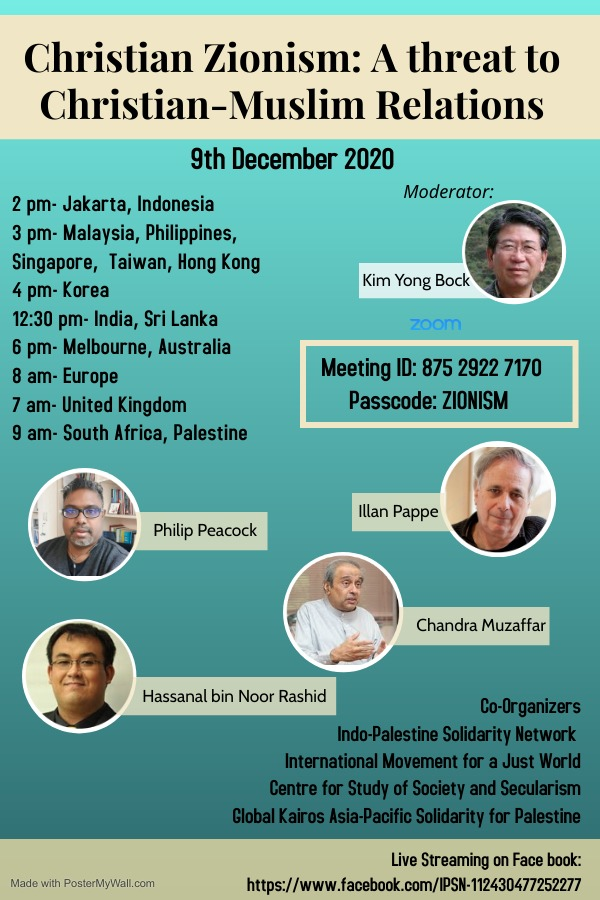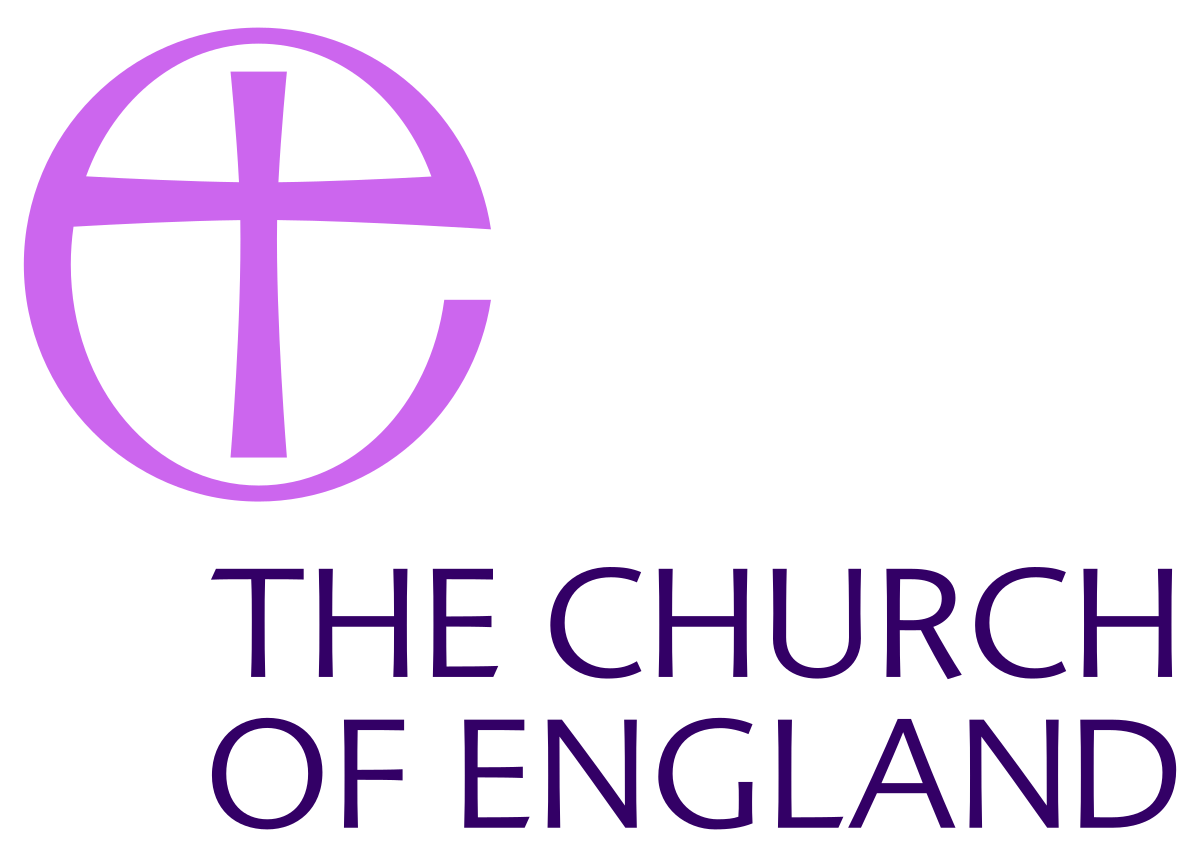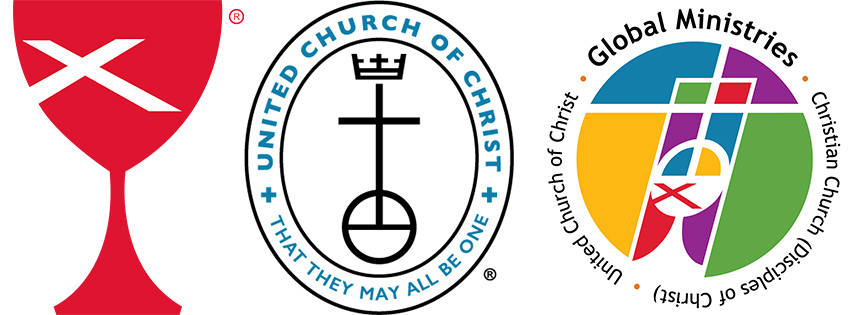On this page:
• Asia-Pacific
• Germany
• India
• Norway
• United Kingdom
• United States
ASIA-PACIFIC
 Voices from the Global South
Voices from the Global South
The theological challenge presented by Christian Zionism is a key theme of “Cry for Hope” and for the Kairos Palestine movement.
Four organizations in the Asia-Pacific region presented a webinar on 9 December 2020, entitled “Christian Zionism: A Threat to Christian Muslim Relations.”
Presented by International Movement for a Just world (JUST, Indo-Palestine Solidarity Network (IPSN), Centre for the Study of Society and Secularism (CSSS), and Global Kairos Asia Pacific Solidarity for Palestine (GKAPS)
From their announcement:
The current trends in relationships between several evangelical groups and Zionist organizations have opened the pathways for them to collectively unleash political pressure in the US that shields Israel from accountability in its continued violations of international law. In recent weeks, we are also experiencing what we may call ‘Muslim Zionism’, clearly based on a distorted religious and political discourse that rationalizes normalizations of relations with Israel at the expense of Palestinian rights.
About 62% of the world’s Muslims live in Asia. Conversations among progressive religious groups and civil society have, therefore, become an imperative to counter the deadly designs of Christian Zionism in Asian churches and in global society at large. Christian Zionists eye the region as a region to swell Islamophobia and conflict. Asia with its tendencies for inter-religious, class and communal/conflicts must, analyze and contextualize the spread of political ideas that emanate from Christian Zionism and its prototypes in the region.
Goal of the Zoom conference
The webinar is intended to generate conversations, and challenge us as Asians to examine our views on Palestine and the role it plays in shaping Islamophobic discourses especially in the Asia region. The Palestinian struggle against settler colonialism has been used by Christian Zionists and segments of the organized Zionist movement to drive Islamophobic discourses around the world and the time to address it is more urgent today than at any other time in the past.
Asians must now reinforce and enhance our role in advancing peace, justice, and dignity for the Palestinians as an urgent necessity. Together, let’s seek to explore the cause of justice for Palestinians.
The video presentations in this webinar:
• Christianity captivated by the power of the times: Kim Yong Bock
• There’s immorality in Christian-Zionist project of seeking legitimacy for Israel: Illan Pappe
• Christian-Muslim Dialogue–Where we are, what are the hindrances: Philip Peacock
• How Christian-Zionism strategizes influence in Malaysia to push its agenda: Hassanal bin Noor Rashid
• Israel & India share a brutal Ethno-Religious-Nationalist ideology: Irfan Engineer
• Fight against Christian-Zionism is a fight against Hegemony: Chandra Muzaffar
• Notes for the future: Ranjan Solomon & Kim Yong Bock
Find and watch all of them here
GERMANY
 Contrasting Responses to Cry for Hope in Germany
Contrasting Responses to Cry for Hope in Germany
Nowhere have the ecclesial, theological, and political issues raised by the Palestinian call been more acute than in Germany. After the release of “Cry for Hope,” a country-wide network of church activists in Germany issued bold challenges to church and civil society leaders at local, regional and national levels.
Here is their report:
“On June 26, 2020, the Kairos Palestine Solidarity Network in Germany organized 20 vigils in order to personally hand over “Cry for Hope: A Call to Decisive Action” to the regional leaders of the Evangelical (Lutheran) church in Germany and the leaders of the Catholic churches. The feedback we received (19 were negative, 3 were supportive) illustrate on the one hand the challenge faced by the Kairos movement to move the churches to action, and, on the other hand, the deep and abiding spirit of the church to stand for justice, even when such action threatens to disturb institutionally-held beliefs and norms.
The response of the Bishop of the church of Kurhessen-Waldeck disturbed us and illustrates the challenge: she rejected the arguments of “Cry for Hope” because (1) it is unacceptable to compare Israel with Apartheid South Africa, (2) it blames Israel alone for the conflict, (3) by supporting BDS, it triggers anti-Semitism, and (4) its reference to Empire evokes the concept of a worldwide Jewish conspiracy.
In contrast, the reply of Bishop Cornelius-Bundschuh of the Church in Baden reads: “As Protestant Christians in Germany, for theological reasons and against the background of our catastrophic history of anti-Judaism, our turn toward reconciling with the Jewish people has been of essential importance to us. As a result we have often not perceived the situation of our Palestinian brothers and sisters with appropriate clarity, fervor and commitment.” The Bishop emphasized that the Bible must not be used to legitimize dispossession and oppression, and affirmed the legitimacy of boycott as resistance. The letter concluded with a commitment to bring “Cry for Hope” and its seven action steps to the next meeting of the Regional Synod.
Dear Mr. Kassis, dear sisters and brothers,
Grace be with you and peace from God our Father and the Lord Jesus Christ!
On June 16, 2020, your “Cry for Hope: Call to Decision and Action” was handed over to me personally. With this you have shared with us the deplorable political circumstances which the Christian communities in Palestine have been facing for years and which have worsened rather than improved. You rightly remind us of the responsibility we have as brothers and sisters in faith towards our Christian brothers and sisters in the Palestinian region.
As Protestant Christians in Germany, for biblical-theological reasons and against the background of our catastrophic history of anti-Judaism, our turn toward reconciling with the Jewish people has been of essential importance to us. As a result we have often not perceived the situation of our Palestinian brothers and sisters with the appropriate clarity, fervor and commitment. But the efforts for justice, for dialogue and reconciliation are indivisible.
That is why it is important for us to assure you in reply to your letter that we hear your “cry” and sincerely share your great concern for this intolerable situation.
We support and strengthen the Palestinians’ quest for state sovereignty: spiritually, morally, materially, and politically. Even though the possibility for coexistence through the two-state solution seems to be a distant prospect, we currently see no other way to justice and peace in the Holy Land. We clearly hear the biblical admonition that the gift of the land for all who live there is linked to the demand for justice and mutual respect.
With you we are convinced that the Bible cannot be used to legitimize disenfranchisement and discrimination or justify geopolitical claims to power at the expense of law and justice. We oppose any instrumentalization of religion by political interests.
We reject the view of current conditions in the Holy Land according to so-called “Christian Zionism” as presaging the End Times. We regard this understanding of biblical texts as inimical to dialogue and as worsening the potential for conflicts.
Rather, we gather around the vision of a free and sovereign Palestine side by side with an state of Israel in a peaceful Middle East. We give our undivided support to those who strive for this goal without violence; we vigorously oppose all those who rely on violence. Against this background, we also consider boycott measures to be legitimate in principle as a nonviolent form of resistance, even if we do not want to join calls for a boycott ourselves.
We want to contribute to the growth of justice and peace in Israel and Palestine. We reaffirm our commitment to use all our means to promote and strengthen actors and initiatives in the region who are willing to engage in dialogue and have an affinity for reconciliation. We believe that God’s command is fundamentally aimed at justice and peace for all people. We call for an end to continued settlement construction and Israeli occupation of Palestinian lands. We reaffirm the declaration of the Evangelical Middle East Commission of 28.5.2020, because any unilateral annexation cements injustice and fuels violence. We call for clear steps towards political independence for Palestine as well as for a renunciation of terror and acts of violence against Israel. We urge all parties in the region to respect human rights and the international community’s international legal provisions.
The Kairos Document was published 10 years ago. The Regional Synod will therefore deal with the “Cry for Hope” of Palestinian Christians at its next or the next but one meeting and thus address the issues behind it in greater depth. Your letter of 25 June with its seven proposals for action will be included in these discussions. We will inform you about the results of the discussion and decision processes.
We conclude our response with the assurance of the 1st letter of Peter: But the God of all grace, who has called you to his eternal glory in Christ, will raise you up, strengthen you, who suffer for a little while, and give you strength and foundation. To him be power for all eternity! Amen.
I wish you much strength and God’s blessing, warm greetings to you,
Prof. Dr. Jochen Cornelius-Bundschuh
Bishop
Source: https://files.constantcontact.com/9a33c36c001/b4f5dcfd-abe0-46e6-9d4d-5339327c9ce9.pdf
INDIA
Webinar links Palestinian and Dalit Struggles
In September 2020, two months after the publication of Cry for Hope, a webinar was presented that linked the Palestinian struggle with the struggle of the Dalits against racism and discrimination. The webinar was co-sponsored by the National Council of Churches in India, the Student Christian Movement of India, the Christian Institute for the Study of Religion and Society, and the National Dalit Christian Watch.
Rev Dr. Gnanavaram of the Tamilnadu Theological Seminary enumerated commonalities in the oppression of Palestinians and Dalits: occupation and denial of right to land; oppressive ideologies (Zionism and Sanadhana Dharma); slavery/servitude; denigration by birth; separate places of habitation; division within their own communities; political powerlessness; poverty.
Mr. Paul Divakar of the Global Forum on Discrimination highlighted similarities in the Palestinian and Dalit narratives in the concepts of purity-pollution, displacement, gross inequalities, and victimization. Dr. Ruth Manorama pointed out that women are under subjugation in any community, but they always remain at center stage of any struggle, including the Palestinian.
Rev. Asir Ebenezer, General Secretary of NCCI, reviewed recent webinars jointly sponsored by NCCI, CISRS, SCMI, NDCW, YMCA, and YWCA in response to “Cry for Hope” and the World Week of Prayer for Peace in Palestine and Israel, which featured the participation of Kairos leaders from Palestine, Germany and the United Kingdom. He referenced BDS and urged all to raise their voices for Palestinian rights.
NORWAY
 Solidarity from the Church of Norway: Statement on Christian Zionism
Solidarity from the Church of Norway: Statement on Christian Zionism
Christian Zionism is a key theme of “Cry for Hope” and a fundamental theological point in the Kairos Palestine Document of 2009.
The 30 November 2020 letter from the Church of Norway is groundbreaking as the official statement of a state church taking direct aim at Christian Zionism. In their statement on Christian Zionism, the Church of Norway Bishops Conference declares that “Christian Zionism is theologically unacceptable and incompatible with human rights.” Describing some groups that are “particularly large in the United States, but are also found in Norway,” the statement continues: “They practice a political theology that ignores international law and human rights. Directly or indirectly, they oppose attempts to create a just peace.”
“There is disagreement about how the land promises in the Bible should be interpreted. But we find it unacceptable to interpret the Bible without regard to the ethical consequences. It is problematic to read ancient prophecies so that all political events today are predetermined by God…Christian Zionism complicates the situation for the churches in Palestine and Israel. This calls for solidarity from the Church of Norway.”
See the World Council of Churches report on this statement from the Bishops of Norway.
UNITED KINGDOM
 Sabeel-Kairos Cry for Hope Campaign
Sabeel-Kairos Cry for Hope Campaign
At their September 2020 conference, Sabeel-Kairos, the UK ‘Cry for Hope’ campaign. The campaign focuses on writing to local clergy to invite them to join a small and intimate online discussion with Palestinian Christian theologians. In these conversations, participants can gain a deeper understanding of what our Palestinian Christian family are facing in their daily lives and what we as individuals and the church in the United Kingdom can do to stand in solidarity with them.
These seminars are a unique opportunity to take part in an exclusive ecumenical event to engage with and learn from local Palestinian experts.
See the invitation letter for the 2021 discussions
Sabeel-Kairos UK Cry for Hope Lenten Series
Sabeel-Kairos UK has launched a series of studies for Lent 2022 focused on the Kairos Palestine ‘Cry for Hope’ and associated themes. This series includes live online events with international speakers, discussion, prayers and actions, every Sunday for five weeks during the season of Lent.
“Cry for Hope – A Call to Decisive Action” was issued in July 2020 by Kairos Palestine, the movement of Christian community in the Holy Land, the Cry was taken up by “Global Kairos for Justice,” a coalition of committed Christians from around the world.
A number of churches in the UK have noted “Cry for Hope” and commended it for study, while others have resolutions before them that call for such recognition. This Lenten course is a resource for such these studies, during the season of Lent and throughout the year.
See the full description of the series here
Watch the series of webinars at the Sabeel-Kairos Youtube Channel
Download the Lenten Study Programme
Download the Study Guide
_________________________________________________
Methodist Conference commends Cry for Hope to Churches for prayerful study
Announcement from Sabeel-Kairos:
Source: https://www.sabeel-kairos.org.uk/methodist-conference-commends-cry-for-hope-to-churches-for-prayerful-study/#more-8781
This week saw the start of Methodist Conference, and we are delighted that our wonderful campaigners within the Methodist Church have succeeded in getting a number of memorials approved which call on the Church to move further forwards in its support and solidarity with the Palestinian Church.
Central to these memorials, which you can read here (Memorials M8-11) is the call for the Methodist Church to read and engage with Cry for Hope, the document issued by Palestinian Christians last year.
We are delighted that the Methodist Church has responded positively, stating in their reply that: “The Conference commends for careful and prayerful study by the Methodist people the document “Cry for Hope”… and welcomes the opportunity to learn from sisters and brothers across the region and across faiths.”
including confirmation of the Joint Advisory Committee on the Ethics of Investment and the Central Finance Board of the Methodist Church’s decision to dedicate time and resources to review the Investment Policy in relation to Israel and Palestine. (You can read the background to this decision and the report from Methodist Council on that here)
In addition, the reply from the Methodist Church also recognises that:
“… recent developments including the passing of the Nation State law in 2018 and statements by the Prime Minister of Israel and other cabinet members suggest that the Government of Israel no longer has an intention to permit a viable Palestinian State in the region. The continued expansion of illegal settlements increases the population of Jewish Israelis in the West Bank, while denying building permits to Palestinians, giving an impression of the permanence of the occupation.”
And calls upon “the British Government to end support for military contracts with Israel whilst that country remains in violation of international law” We wish to thank the Methodist Church for its courageous stand in not only exposing the reality and truth of the situation in Israel and Palestine today, but for also being willing to play a part in bringing about real peace and justice for all.
We also wish to thank our wonderful Methodist Sabeel-Kairos Campaign group, who with dedication, time and much effort in the last few years, have helped to produce these fantastic results in support of Palestine.
 Carlisle Diocese passes historic Cry for Hope motion
Carlisle Diocese passes historic Cry for Hope motion
On Saturday 9 of October [2021], 60 members of the Church of England gathered together under the leadership of the Bishop of Carlisle, The Rt Revd James Newcome for their autumn Diocesan Synod meeting. Members included clergy and lay people. On their agenda was a motion passed by Solway Deanery, calling on the Church of England to be more proactive in its support and solidarity with Palestinian Christians.
The motion, presented by Solway Deanery member Valerie Hallard, read as follows:
That This Synod
• Endorses the “Cry for Hope”[1] expressed by Palestinian Christians and the ‘Global Kairos for Justice’ coalition[2] (GKfJ);
• Requests that the Faith and Order Commission produce a report which analyses and refutes any theological justifications, for example, those promoted by some Christian Zionists, for the oppression of Palestinians.
• Instructs the Ethical Investment Advisory Group to provide guidance to the National Investing Bodies (NIBs) and Dioceses that will enable them to screen their investments and thereby make decisions regarding engagement with, and divestment from, companies which profit from the occupation.
Valerie Hallard proposed the motion during the Diocesan Synod meeting and gave a powerful address, highlighting the ongoing injustices and the deteriorating situation in Palestine. She quoted directly from Cry for Hope in which Palestinian Christians describe their situation as ‘beyond urgent’ and that as Christians ‘We have come to the end of the illusion that Israel and the world powers intend to honour and defend the rights of the Palestinian people to dignity, self-determination, and the fundamental human rights guaranteed under international law’.
During the debate that followed, several members of the Synod expressed support for the motion, speaking about the importance of challenging injustice, not being silenced on this issue, and how it could be used to set a precedent for the Church to challenge situations of injustice across the world. The Bishop of Carlisle gave a short speech of support during which he described that during a visit to the Holy Land, a former female solider in the Israeli Defence Forces had spoken powerfully against the occupation and the actions of the Israeli military in how they treated Palestinians.
The debate was followed by a vote, in which the motion was passed unopposed.
This vote has historic consequences for the Church of England. Firstly, and perhaps of greatest importance is that the Carlisle Diocese offers a beacon of light and hope to the Palestinian Christian community, being the first Diocese to officially endorse the Cry for Hope.
Secondly, this motion will now proceed to General Synod, where it will be debated in due course. Although this may be some time away, it will be the first time in many years in which the Palestinian cause has been raised in a significant way in the national decision-making body of the Church of England.
Following the Synod meeting, proposer of the motion on behalf of Solway Deanery, Valerie Hallard said the following:
“I have been humbled by the resilience and hospitality of Christians who have been present in the land since the time of Christ. They are living in the face of discrimination and hardship, and I see it as the duty of the church to amplify their voice in the face of so much that seeks to silence it.”
[1] “Cry for Hope: A call to decisive action” July 2020: https://www.cryforhope.org
[2] Global Kairos for Justice: https://cryforhope.org/index.php/about-global-kairos
SOURCE: https://www.sabeel-kairos.org.uk/carlisle-diocese-passes-historic-cry-for-hope-motion/#more-8919
UNITED STATES
 Disciples and UCC Leaders issue a Message and Call in response to the “Cry for Hope”
Disciples and UCC Leaders issue a Message and Call in response to the “Cry for Hope”
In response to Cry for Hope, the urgent call to end the oppression of the Palestinian people issued by Kairos Palestine and Global Kairos for Justice, the General Ministers and Presidents of the Christian Church (Disciples of Christ) and United Church of Christ, as well as the Co-Executives of Global Ministries, have released a “Message and Call in Response to the Kairos Palestine Cry for Hope.
The Rev. Teresa Hord Owens and the Rev. Dr. John Dorhauer, General Ministers and Presidents of the
Disciples and UCC, respectively, and the Rev. Dr. Julia Brown Karimu and the Rev. Dr. Karen
Georgia Thompson, Co-Executives of Global Ministries, having received the Cry for Hope,
have taken the opportunity to reach out to members of the two churches.
In their message, they offer ways that the Cry for Hope can be studied and acted on by church members. They also reiterate their strong opposition to anticipated Israeli efforts to annex parts of the
occupied West Bank, and to occupation.
See the full text of their message
Download their message
____________________________________
A cry for hope amidst despair in Palestine
An international response is essential for restorative justice
From the Presbyterian News Service
LOUISVILLE — A webinar focusing on the current context of the Palestinian people, “A cry for hope amidst despair in Palestine,” was hosted Tuesday by Presbyterian World Mission’s Middle East and Europe office and the Office of Public Witness. It included speakers from two social justice and human rights organizations — one Palestinian and one Israeli — which have defined Israel as an apartheid state.
The first speaker, Yasmine Rishmawi…was born and raised in Bethlehem, Palestine, is a member of the steering committee of the Palestine Youth Ecumenical Movement (PYEM) and has been actively engaged with the World Student Christian Federation since 2010. She said one of the greatest challenges Palestinian youth face today is the phenomenon known as Christian Zionism.
“As Palestinian Christians, and youth especially, we witnessed growing up calls from many politicians and theologians affirming fundamental interpretations of some texts in the Bible that our land does not belong to us,” she said. “We witnessed our land being confiscated, our families being imprisoned, our rights being liquidated, and our water, culture, language and traditions and traditional food being stolen before our own eyes.”
[Additional speakers included Rifat Kassis, General Coordinator of Kairos Palestine, the Christian Palestinian movement and co-author of the Kairos Palestine Document, and Hagai El-Ad, the Executive Director of B’Tselem, the renowned Israeli Human Rights Center.]
Read the full report at Presbyterian News Service
Download the report



